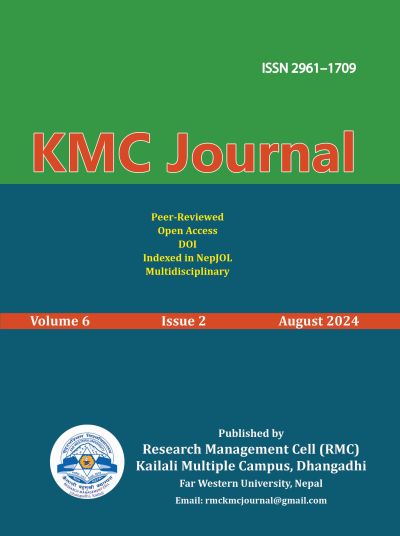Exploring English Teachers’ Cooperative Practices in Teaching Writing Skills
DOI:
https://doi.org/10.3126/kmcj.v6i2.68891Keywords:
Classroom management, group and pair work, ICT, think-pair-shareAbstract
Cooperative language learning (CLL) is considered one of the communicative approaches in which students participate in collaborative learning activities in actual classroom settings. This research aims to examine English instructors’ cooperative practices in instructing writing skills. I employed the narrative inquiry to explore the teaching and learning stories of teachers through their lived stories. This research study seeks to add to the discourse of cooperative practices in English language classrooms to enhance the writing skills of learners in the context of Nepal. Four English instructors from four public secondary schools in Rupandehi district were purposefully selected as participants for this study. The in-depth unstructured interview was used as a tool for collecting data. I adopted social constructivism as a theoretical framework. This study uncovered that the teacher participants used CLL activities such as think-pair-share and group work activities to energize, optimize and enhance students’ writing skills. Moreover, CLL increases learners’ insights and confidence by enhancing their creativity and critical thinking ability in writing through teamwork and makes them more responsible and accountable for learning themselves through their active engagement in various cooperative activities. The study reveals teacher participants’ effective practices of cooperative language learning in generating and creating fresh information to offer a solution to the assigned writing tasks and make learning successful. Teamwork, group work and think-pair-share activities contribute to the learners’ success in writing skills.
Downloads
Downloads
Published
How to Cite
Issue
Section
License

This work is licensed under a Creative Commons Attribution-NonCommercial 4.0 International License.
This license allows reusers to distribute, remix, adapt, and build upon the material in any medium or format for noncommercial purposes only, and only so long as attribution is given to the creator.




